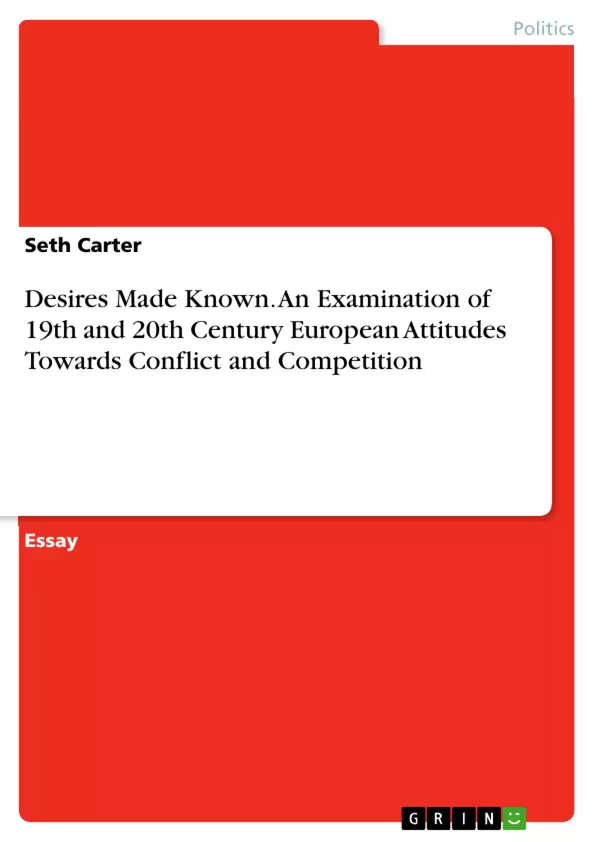This paper will explore societal attitudes predominantly in western and central Europe towards violence by dissecting the vacuum left by retreating societal institutions of the Middle Ages and Enlightenment. The way that Europeans largely approached and often glorified violence during this period and immediately prior will also be examined to gain closer insight into the ideologies that led nations into catastrophe.
The 19th and 20th centuries in western civilization revealed new attitudes towards nationalism and militarism with disastrous implications for the whole of human life. In the history of ideas, investigating the writings of intellectuals, the elite, and the common man during this period has the potential for clarifying why these attitudes arose and how indelibly their influence shaped the thinking of 19th and 20th century western societies.
Inhaltsverzeichnis (Table of Contents)
- Initial Questions for Thesis Development
- What was the perceived domain of conflict and competition for earlier thinkers and how does this domain appear to change over time?
- Is it possible that tendencies towards violence were similar in their frequency throughout western history, but just utilized different mediums of expression as time passed?
- If western ideas towards competition actually did become markedly more violent in general, what causes might this be attributed to?
- How might dominant worldviews have altered conceptions, interpretations, and applications of competition by influencing the foregrounding and values of the writers who subscribed to them?
Zielsetzung und Themenschwerpunkte (Objectives and Key Themes)
This text aims to investigate the evolving relationship between conflict, competition, and violence in Western culture, particularly focusing on the transition from the Middle Ages to the 19th and 20th centuries. It seeks to understand why a more explicit emphasis on violence within competition became apparent during this period.
- The continuity of violent competitive tendencies throughout Western history.
- The influence of dominant worldviews, such as religion, feudalism, nationalism, and militarism, on conceptions of competition and violence.
- The role of societal institutions, such as gladiatorial games, tournaments, and dueling, in shaping perceptions of competition and violence.
- The impact of secularization and the rise of nationalism on the expression of violent competition in 19th and 20th-century thought.
- The interplay between religious and secular perspectives on conflict and competition.
Zusammenfassung der Kapitel (Chapter Summaries)
The text begins by exploring the perceived domain of conflict and competition in earlier Western thought. It then delves into evidence demonstrating the historical link between violence and competition, drawing examples from ancient Rome, the Middle Ages, and the Renaissance. The text examines how dominant religious and feudal views, as espoused by figures like Thomas Aquinas and John of Salisbury, shaped perceptions of warfare and obscured the role of competitive motivations in conflict. Subsequently, the text investigates the influence of secularizing forces, such as nationalism and militarism, in expanding and shaping the expression of violent competition in 19th and 20th-century intellectual thought. It suggests that the decline of religious and feudal frameworks provided a vacuum that allowed for a more prominent focus on competitive motivations within conflict.
Schlüsselwörter (Keywords)
The text centers on the key themes of conflict, competition, violence, and the interplay of religion, feudalism, nationalism, and militarism in shaping perceptions of these concepts throughout Western history. Specific examples and figures include gladiatorial games, tournaments, dueling, Thomas Aquinas, John of Salisbury, and the role of secularization in shaping intellectual thought. The text examines the evolution of these ideas across different historical periods, from ancient Rome through the Middle Ages, the Renaissance, and into the 19th and 20th centuries.
Frequently Asked Questions
How did attitudes toward violence change in 19th and 20th century Europe?
During this period, there was a shift toward glorifying violence within the context of nationalism and militarism. The decline of medieval and Enlightenment institutions left a vacuum that was filled by more explicit and violent competitive ideologies.
What role did feudalism play in shaping early concepts of conflict?
Feudal worldviews, often influenced by religious thinkers like Thomas Aquinas, framed conflict within specific social and moral hierarchies, often obscuring the purely competitive motivations behind warfare.
How did societal institutions like tournaments influence views on competition?
Institutions such as gladiatorial games, tournaments, and dueling served as mediums for expressing and regulating violent competition, reflecting the values of the societies that practiced them.
What is the impact of secularization on violent competition?
Secularization led to the decline of religious frameworks that previously restrained or interpreted conflict. This allowed nationalist and militarist ideologies to redefine competition in more violent and catastrophic terms.
Why did Europeans glorify violence leading up to the 20th century?
The glorification arose from a combination of new nationalistic identities, the professionalization of militaries, and intellectual writings that framed struggle and conflict as essential for national progress.
- Quote paper
- Seth Carter (Author), 2017, Desires Made Known. An Examination of 19th and 20th Century European Attitudes Towards Conflict and Competition, Munich, GRIN Verlag, https://www.grin.com/document/371668



